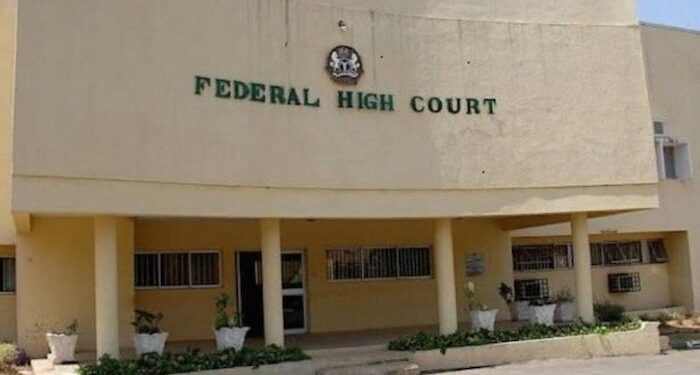A federal high court in Abuja has dismissed a lawsuit that sought to halt the general election due to the exclusion of Nigerians in diaspora.
Wednesday, the presiding judge, Inyang Ekwo, ruled that the lawsuit lacked merit.
The judge also ruled that the country’s laws do not guarantee Nigerians residing overseas the right to vote in elections.
“The court does not pass legislation. The court ruled that it cannot also expand the law to accommodate an issue before it, regardless of how sympathetic or humanitarian the cause or circumstance may be.
Advertisement
“It only interprets and expounds the laws, and it is the law as stated before in this judgment, that when interpreting the provisions of a statute, the court must not ascribe meanings to clear, plain and unambiguous provisions in order to make such provisions conform to the court’s view of their meanings or what they ought to be.”
According to sections 77(2) and 117(2) of the Nigerian constitution of 1999 (as amended), the right to vote is reserved for Nigerian citizens who reside in Nigeria, the judgment stated.
The judge continued, “According to sections 132(5) and 178(5) of the 1999 constitution (as modified), the ability to vote for president or governor is related to the right to vote in an election of any legislative house.”
Ekwo also expressed concern regarding the suit’s filing three months before the general election.
“The applicants deserve praise for bringing this issue to light. However, the court is not the option at this time,” he stated.
“This case has proven that the existing law does not adequately protect the right of Nigerians in the diaspora to vote in Nigerian elections.
“The void in this case cannot be filled by judicial pronouncement or by importing statutory provisions from elsewhere.”
There exists a predicament that can only be resolved through legislative rather than judicial means.
Chikwe Nkemnacho and Kenneth Nkemnacho, who reside in the United Kingdom, filed the lawsuit on behalf of Nigerians living in the diaspora.
Independent National Electoral Commission (INEC), the chairman of INEC, the president of the Federal Republic of Nigeria, and the Federal Republic of Nigeria are listed as the first through fourth defendants, respectively.
In the complaint filed FHC/ABJ/CS/2119/2022, the plaintiffs sought the court to force INEC and the federal government to cease campaigning for the 2023 elections until they are included as registered voters for the polls.
In addition, they urged the court to decide that, pursuant to Articles 13, 14, 42, and 17 of the 1999 Constitution, persons of voting age are permitted to participate in the electoral process by registering to vote in all elections, regardless of where they reside.
A federal high court in Abuja has dismissed a lawsuit that sought to halt the general election due to the exclusion of Nigerians in diaspora.
Wednesday, the presiding judge, Inyang Ekwo, ruled that the lawsuit lacked merit.
The judge also ruled that the country’s laws do not guarantee Nigerians residing overseas the right to vote in elections.
“The court does not pass legislation. The court ruled that it cannot also expand the law to accommodate an issue before it, regardless of how sympathetic or humanitarian the cause or circumstance may be.
“It only interprets and explains the laws, and it is the law, as stated previously in this opinion, that when interpreting the provisions of a statute, the court must not ascribe meanings to clear, plain, and unambiguous provisions in order to conform such provisions to the court’s view of their meanings or what they should be.”
According to sections 77(2) and 117(2) of the Nigerian constitution of 1999 (as amended), the right to vote is reserved for Nigerian citizens who reside in Nigeria, the judgment stated.
The judge continued, “According to sections 132(5) and 178(5) of the 1999 constitution (as modified), the ability to vote for president or governor is related to the right to vote in an election of any legislative house.”
Ekwo also expressed concern regarding the suit’s filing three months before the general election.
“The applicants deserve praise for bringing this issue to light. However, the court is not the option at this time,” he stated.
“This case has proven that the existing law does not adequately protect the right of Nigerians in the diaspora to vote in Nigerian elections.
“The void in this case cannot be filled by judicial pronouncement or by importing statutory provisions from elsewhere.”
There exists a predicament that can only be resolved through legislative rather than judicial means.
Chikwe Nkemnacho and Kenneth Nkemnacho, who reside in the United Kingdom, filed the lawsuit on behalf of Nigerians living in the diaspora.
Independent National Electoral Commission (INEC), the chairman of INEC, the president of the Federal Republic of Nigeria, and the Federal Republic of Nigeria are listed as the first through fourth defendants, respectively.
In the complaint filed FHC/ABJ/CS/2119/2022, the plaintiffs sought the court to force INEC and the federal government to cease campaigning for the 2023 elections until they are included as registered voters for the polls.
Additionally, they urged the court to decide thatin accordance with sections 13, 14, 42, and 17 of the 1999 constitution, those of them who are of voting age are allowed to take part in the electoral process by registering to vote in all elections, regardless of their places of residence.


